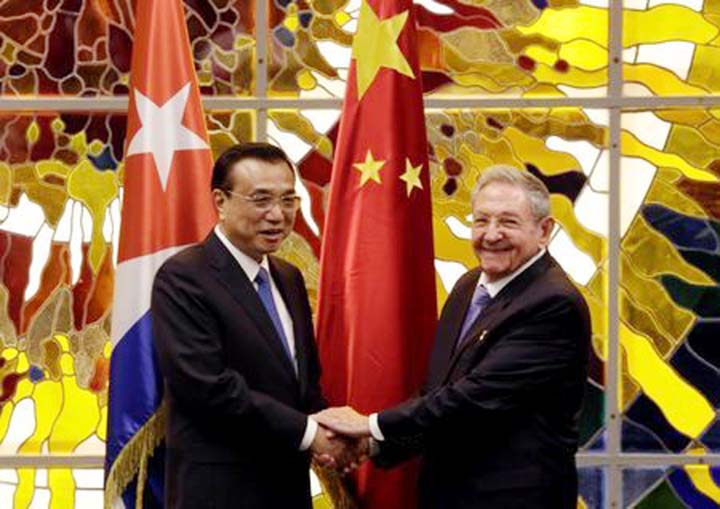
AFP, Havana :
Chinese Premier Li Keqiang said it was time for a new direction in relations with Cuba, during a landmark visit to the Americas’ lone communist-ruled state.
During the first visit by a Chinese premier since the two countries established diplomatic relations 56 years ago Li pledged to “inject a new dynamic in (bilateral) relations,” Cuban state media reported.
Li met with President Raul Castro at the Palace of the Revolution, with the two communist countries signing about 30 cooperation agreements in a wide range of areas, including a protocol canceling Cuban debts and four loan deals for projects on the island, according to local television.
Though the Cold War ended years ago, Cuba remains isolated after having lost the Soviet Union, and then Venezuela, as its key political and economic allies.
Cuba has restored full diplomatic relations with its longtime nemesis, the United States.
Havana is cash-strapped and does not have access to commercial credit.
China is Cuba’s top creditor-and its number two trade partner after Venezuela. Their total bilateral trade was worth $1.6 billion in 2015, Chinese sources said.
Li called for deepening cooperation on biotechnology, renewable energy, computers, home appliances and farm machinery, as well as in culture, education and tourism.
Li arrived from Canada, after announcing with Canadian Prime Minister Justin Trudeau an agreement to begin talks aimed at reaching a free-trade agreement. The two leaders set a target of doubling trade by 2025.
China is Canada’s second-largest trading partner after the United States, with trade last year exceeding Can$85 billion ($64.5 billion US).
China is Cuba’s second largest trading partner after Venezuela. The two countries traded $1.6 billion in the first nine months of 2015, a 57 percent increase on the same period the previous year, official Cuban data shows.
Li said in an interview with the Cuban Communist Party newspaper Granma that his trip aimed to deepen the two countries’ relationship, forge new areas of economic cooperation and “intensify the mutual political trust.”
The two countries signed agreements on collaboration in the science, environmental, industry, energy, public health and agricultural sectors, Cuban state TV said. China also agreed to extend lines of credit for certain projects, it added, but did not specify how much.
Cuba has become a hot destination for tourists, foreign investors and leaders alike since the government embarked on business-friendly reforms and Havana and Washington announced a detente nearly two years ago after decades of hostility.
Earlier this week, Shinzo Abe became the first Japanese prime minister to visit Communist-ruled Cuba, saying he wanted to deepen the two countries’ relationship.
Li landed in Havana on Saturday and is set to leave early on Monday. No news conference is scheduled during his visit.

